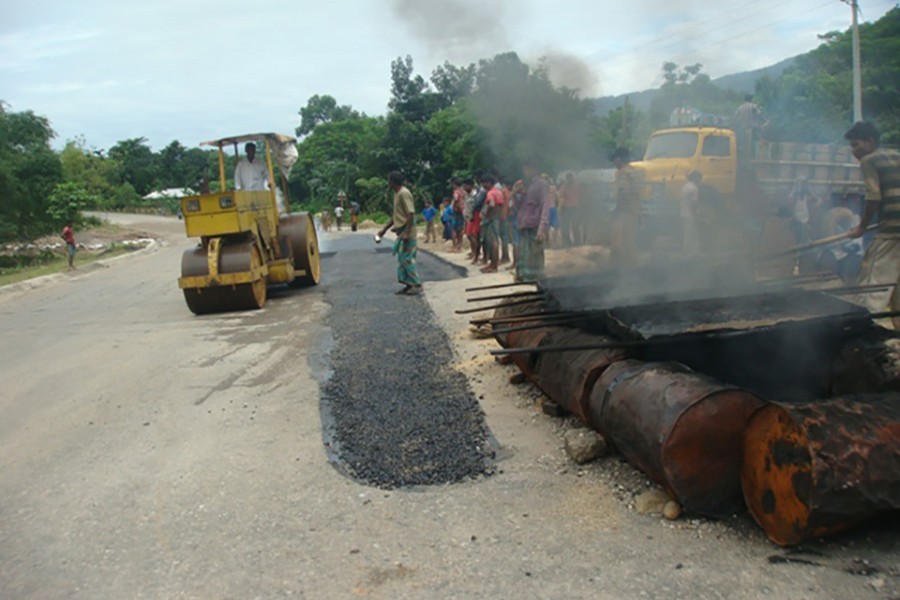Govt agencies often take development projects sans due diligence

Published :
Updated :

Some government agencies often take up development projects without specifying the scope of work, designs and detailed cost breakdown that cause wastage of public money, insiders said on Saturday.
Lack of feasibility studies and non-specified scope of work and their costs in the development project proposal (DPPs) ultimately cause time and cost overrun of such projects, they said.
Planning Commission (PC) officials said that these are clear violations of the government rules and regulations regarding project preparation, processing, and approval.
Development analysts have strongly criticised such effort and suggested the PC to scrutinise projects strictly before giving its nod.
Policy Research Institute (PRI) Executive Director Dr Ahsan H Mansur told the FE that without proper feasibility study, detailed design, and specific cost breakdown, the PC should not approve such projects.
Among the public agencies, the Local Government Engineering Department (LGED) is one of the pioneers of taking up projects in such a manner, insiders said.
In most cases, the LGED does not specify the length of a road or bridge or culvert, construction site, design and necessary materials, and the exact cost of each of the components in the DPP, officials involved with the development process alleged.

The PC has recently raised its reservations on some of the projects of the LGED due to violation of the planning disciplines and sent the DPPs back for recasting, they said.
They added that the LGED did not conduct feasibility studies on the projects and sent those for getting approval of the PC or searching funds from the development partners.
The LGED has recently taken up a "Climate and disaster resilient small scale water resources management project" involving a cost of Tk 18.77 billion without specifying the cost of different components and sought money from the block allocation in the budget.
Out of some 84 items, the LGED did not specify the quantity and their costs for 28 items in the DPP, an official involved with the project told the FE.
It has kept aside a block allocation of Tk 2.86 billion for the 28 items in the proposed project, he said, requesting anonymity.
The PC officials said the project included 380 sub-projects, keeping aside a cost of Tk 8.34 billion.
The LGED has included the list of only 80 sub-projects and their costs in the DPP while the list of remaining 300 sub-projects were not included with their specific costs, they said.
In this project, the LGED proposed to acquire 31.69 acres of land at Tk 380.3 million without specifying the land locations.
Similarly, it has not specified many other components with design, scope of work and cost breakdown in the DPP, the project insiders said.
The LGED has recently sought the PC's approval for another Preliminary DPP titled "Enhancement and rehabilitation of small scale water management system (Rubber dams and command area development (CAD)", but did not specify the costs for each of the 50 rubber dams, 61 command areas and their developments, and for many other components in the PDPP.
The PC has sent back the PDPP to the LGED and requested recasting the documents with feasibility study, designs of the scope of work and their details cost-breakdown.
Without upgrading the PDPP as per the recommendations, the PC would not approve the PDPP, said a senior PC official.
When asked, a senior PC official said there is a guideline of the Planning Division for project preparation, processing, approval and revision where it is clearly directed to conduct feasibility study, design of construction work, specific cost and their breakdown, and specific project sites.
This correspondent made several attempts over the phone to talk with LGED Chief Engineer Sheikh Md Mohsin, but failed.
Economist Dr Ahsan H Mansur said the LGED and other government agencies should design the bridges, culverts, roads or any other infrastructures before taking up projects.
And, every component of the projects should have specific scope of work and cost breakdown for their quality implementations, he added.
If the agencies fail to take up projects properly, the time and costs will overrun and the country will waste a lot of public money, Dr Mansur said.
kabirhumayan10@gmail.com


 For all latest news, follow The Financial Express Google News channel.
For all latest news, follow The Financial Express Google News channel.